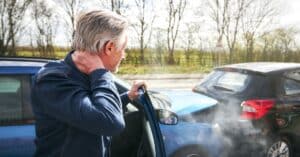How do I Know if I Have a Concussion After a Car Accident?

Defining a Concussion
The Mayo Clinic states that concussions are mild traumatic brain injuries that affect a person’s brain functions. The effects of a concussion are usually temporary, but that is not always the case. There are times when concussions, particularly successive concussions, can lead to long-term brain damage. Concussions are typically caused by a bump or blow to the head, or any external action that vigorously jolts the body forward and backward or side to side.
Symptoms to Lookout For After a Crash
It is not uncommon for individuals to feel no signs or symptoms of a concussion right after a vehicle accident occurs. Immediately after a collision, our bodies are often flooded with adrenaline that masks the signs and symptoms of any pain. Additionally, concussions, because they happen inside of the skull, are not visible. This means that we cannot tell whether or not our brain has been bruised or is experiencing any swelling. If the brain continues to swell or bleed beneath the skull, this can lead to delayed symptoms after an accident occurs.
There are various signs and symptoms that you need to be aware of concerning concussions after an accident. If you begin to experience any of the following or notice that a loved one is beginning to experience the following, you need to seek medical care immediately:
- Worsening headaches
- Drowsiness or inability to wake up
- One pupil larger than the other
- Any numbness or weakness
- Decreased coordination
- Slurred speech
- Nausea or vomiting
- Convulsions or seizures
- Unusual behavior or agitation
- Loss of consciousness (even a brief loss of consciousness)
If your child has been involved in a vehicle accident, please understand that all the same signs and symptoms apply, but younger children may not be able to communicate that they are experiencing any type of distress. If you have a younger child that will not stop crying and cannot be consoled, or if the child will not nurse or eat, this could be a sign that a concussion has occurred.
Seek Medical Care Immediately
We encourage any individual involved in a vehicle accident to seek medical treatment as soon as possible. Sometimes, this means taking an ambulance to the hospital, but it may be possible to have a friend or family member drive you to an emergency clinic or your primary care physician. You need to do this on the same day as the accident. Often, a doctor will notice signs and symptoms of concussions and other types of unseen injuries before you are aware of them and take the steps necessary to treat them accordingly.
Call us today to speak with a Raleigh car accident lawyer.
